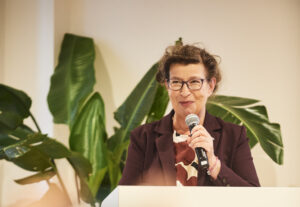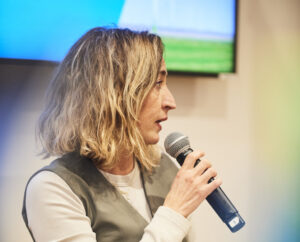As the EU Commission and representatives of member states gather on 3 April 2025 to discuss the reform of EU chemicals legislation REACH, HEAL stresses the importance of putting health at the core of the revision. The CARACAL meeting will see the EU Commission present their initial plan for reforming REACH.
The Health and Environment Alliance (HEAL) annual General Assembly brought together HEAL members and stakeholders dedicated to advancing the protection of people’s health against environmental and climate threats in the European Union and beyond. This year’s assembly emphasised collaboration, strategic engagement, and advocacy to address key challenges at the start of the new EU policy cycle 2024-29.
HEAL was delighted to welcome Leena Ylä-Mononen, the Executive Director of the European Environmental Agency, for an exchange. She presented the EEA’s recent work on the health impacts and risks regarding climate change and pollution and urged more action and collaboration across different entities:
 “Climate change is already impacting public health, with rising heatwaves, droughts, and floods disproportionately affecting vulnerable populations. These challenges underscore the urgent need for a systemic approach to address the intertwined crises of climate change, biodiversity loss, and pollution. As we navigate this polycrisis, gathering concise data and investing in effective actions is crucial to mitigate health risks and ensure a sustainable future.“
“Climate change is already impacting public health, with rising heatwaves, droughts, and floods disproportionately affecting vulnerable populations. These challenges underscore the urgent need for a systemic approach to address the intertwined crises of climate change, biodiversity loss, and pollution. As we navigate this polycrisis, gathering concise data and investing in effective actions is crucial to mitigate health risks and ensure a sustainable future.“
Key Challenges and Opportunities for Protecting Health from Climate and Environmental Threats in the New EU Agenda
For the panel session ‘Key Challenges and Opportunities for Protecting Health from Climate and Environmental Threats in the New EU Agenda’, Ylä-Mononen was joined by Vanessa Lopez, Co-founder and Executive Director of Salud por Derecho and HEAL board member, and Peter van den Hazel, HEAL President and the International Coordinator of the International Network for Children’s Health, Environment, and Safety. The panel was moderated by HEAL’s Deputy Director Anne Stauffer.

The panel highlighted the urgent need for a paradigm shift in how we perceive and address the stress climate change and pollution place on health. The experts emphasised that the impacts of climate change, pollution and biodiversity loss are here and now, and especially affecting those already at a disadvantage. Hence, there is a pressing need to enhance public awareness through compelling narratives and personal stories, as well as data on the cost of inaction, which can galvanise support for necessary interventions and collaboration across health and environmental sectors.
 “Pollution is a personal issue that directly impacts families, yet it is often treated as a broader public concern. We must integrate personal narratives into policy discussions, recognise the economic harm pollution causes, and ensure that safety measures keep pace with innovation. Understanding the complexities of multiple sources of exposure, including transgenerational effects, is crucial for fostering a more cautious approach to environmental health,” Peter van den Hazel stated.
“Pollution is a personal issue that directly impacts families, yet it is often treated as a broader public concern. We must integrate personal narratives into policy discussions, recognise the economic harm pollution causes, and ensure that safety measures keep pace with innovation. Understanding the complexities of multiple sources of exposure, including transgenerational effects, is crucial for fostering a more cautious approach to environmental health,” Peter van den Hazel stated.
Ultimately, addressing the health impacts of pollution and climate change also requires a concerted effort to educate and engage communities, ensuring that the scientific evidence and policy measures evolve into meaningful action. This was echoed by Vanessa Lopez:
 “Climate change is often perceived as a distant problem, but we must challenge this notion and actively engage with communities, especially those sceptical of science. To foster acceptance of climate interventions, we need compelling narratives that resonate with all constituencies, including more conservative ones. Additionally, the active involvement of health ministers in environmental discussions is essential for driving collaboration at the national level.“
“Climate change is often perceived as a distant problem, but we must challenge this notion and actively engage with communities, especially those sceptical of science. To foster acceptance of climate interventions, we need compelling narratives that resonate with all constituencies, including more conservative ones. Additionally, the active involvement of health ministers in environmental discussions is essential for driving collaboration at the national level.“
HEAL elects new Executive Committee and welcomes new member
HEAL members elected the Executive Committee, who will serve from 2024-2028:
- President: Vanessa López , Salud Por Derecho, Spain
- Vice President: Christian Horemans, Mutualités Libres – Onafhankelijke Ziekenfondsen, Belgium
- Treasurer: Romain Dries, France Nature Environnement, France
- Panagiotis Chaslaridis, European Federation of Allergy and Airways Diseases Patients’ Associations
- Marie Christine Dewolf, Hainaut Analyses, Belgium
- Tomaž Gorenc, Institute of Health and Environment, Slovenia
- Filip Raciborski, Polish Society of Allergology, Poland

HEAL also welcomed a new member Bond Beter Leefmilieu, which is a Belgian organisation working to unite nature and environmental organisations in Flanders, to initiate a transition to a society, that is fully renewable with a circular economy.
The 2024 HEAL General Assembly fostered collaboration and strategic dialogue around pressing environmental health issues. HEAL Director Génon K. Jensen states: “Together, we must continue to advocate for comprehensive policy changes that protect both public health and our planet for current and future generations.”
HEAL thanks the participants, speakers, and panellists for their contributions to this year’s general assembly!

